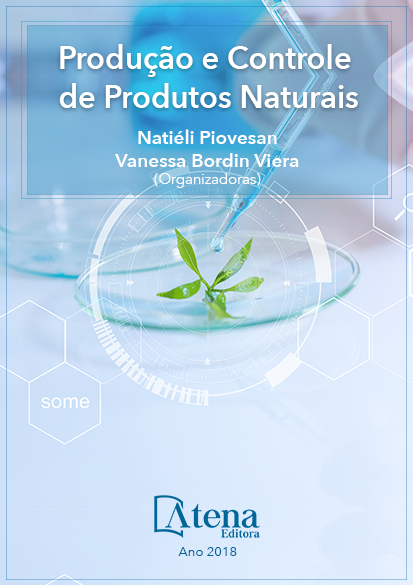
Coriandrum sativum EM ESTÁDIO VEGETATIVO E FLORAÇÃO INDUZ ATIVIDADE ANTICÂNCER in vitro
Coriandrum sativum L. (Apiaceae),
coentro, é uma planta condimentar que
apresenta grande variedade de atividades
biológicas. O objetivo deste estudo foi avaliar
a influência do estádio vegetativo e floração
sobre o teor total de flavonoides e as atividades
antioxidante, citotóxica, anti-citotóxica e
antiploriferativa in vitro de extratos brutos de
Coriandrum sativum cultivado sob adubação
orgânica. As plantas foram cultivadas com
adubação orgânica e as folhas foram coletadas
no estádio vegetativo e floração para produção
do extrato bruto hidroalcoólico usado para
os testes químicos e biológicos. O teor total
de flavonoides observado foi similar entre o
estádio vegetativo e floração. Nos ensaios
antioxidantes, ABTS e DPPH, foi verificado
semelhante poder redutor para os extratos
de C. sativum, estádio vegetativo e floração.
Ambos extratos induziram efeitos citotóxicos
linfócitos humanos e sarcoma-180 após 24h e
48h de tratamento. Para os dois extratos, às 48h
de tratamento, verificou-se maior citotoxicidade
para as células de sarcoma-180. No ensaio de
anti-citotoxicidade, pré-tratamento, os extratos
testados não promoveram ação preventiva
contra danos citotóxicos induzidos pela
cisplatina. Esses resultados sugerem que para
C. sativum cultivado sob adubação orgânica
o estádio de desenvolvimento, vegetativo
e floração, não interfere no conteúdo total
de flavonoides e nas atividades biológicas
avaliadas. Estes achados reforçam o uso dessa
planta condimentar na culinária e na medicina tradicional, promovendo a prevenção
de doenças e com potencial uso para o desenvolvimento de fármacos de combate ao
câncer.
Coriandrum sativum EM ESTÁDIO VEGETATIVO E FLORAÇÃO INDUZ ATIVIDADE ANTICÂNCER in vitro
-
DOI: Atena
-
Palavras-chave: coentro, ABTS, DPPH, ensaio do MTT, antiproliferativo.
-
Keywords: coriander, ABTS, DPPH, MTT assay, antiproliferative.
-
Abstract:
Coriandrum sativum L. (Apiaceae), coriander, is a seasoning plant
that presents a great variety of biological activities. The objective of this study was
to evaluate the influence of the vegetative stage and flowering on the total flavonoid
content and the antioxidant, cytotoxic, anti-cytotoxic and antiploriferative activities in
vitro of extracts of Coriandrum sativum grown under organic fertilization. The plants
were cultivated with organic fertilization and the leaves were collected at the vegetative
stage and flowering to produce the crude hydroalcoholic extract used for chemical and
biological tests. The total flavonoid content observed was similar between vegetative
stage and flowering. In the antioxidant tests, ABTS and DPPH, similar reductive power
was verified for extracts of C. sativum, vegetative stage and flowering. Both extracts
induced cytotoxic effects in human lymphocytes and sarcoma-180 cells after 24h and
48h of treatment. Both extracts, at 48 hours of treatment, increased the cytotoxic effect
in sarcoma-180 cells. In the anti-cytotoxicity assay, pretreatment, the extracts tested
did not promote preventive action against cytotoxic damages induced by cisplatin.
These results suggest that for C. sativum cultivated under organic fertilization the stage
of development, vegetative and flowering, does not interfere in the total content of
flavonoids and in the biological activities evaluated. These findings reinforce the use of
this spice plant in cooking and traditional medicine, promoting disease prevention and
potential use for the development of cancer fighting drugs.
-
Número de páginas: 15
- Vanessa Silva dos Santos
- Jean Carlos Vencioneck Dutra
- Suiany Vitorino Gervásio
- Paula Roberta Costalonga Pereira
- Mainã Mantovanelli da Mota
- Patrícia Carara dos Santos
- Maria do Carmo Pimentel Batitucci


